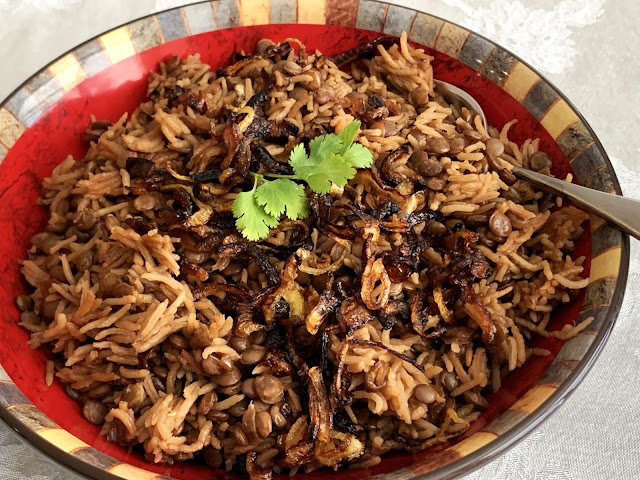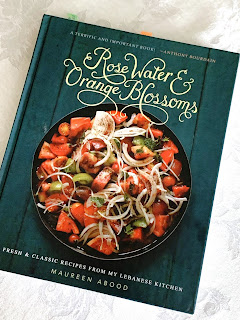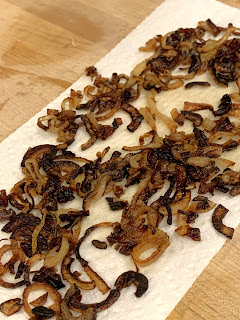I like lentils. Liking lentils in the first place, may - or may not - preclude some from liking this dish.
I had heard of Mujadara. I just never researched it to find out what, exactly, it was. I am not at all sure how or why I missed out on this meal, but I surely do wish I'd found out sooner, because it is one amazingly flavored dish.
 |
| Mujadara |
Mujadara is a Lebanese / Middle Eastern concoction of lentils and rice. Rice can be substituted with bulghur. Lentils and rice are pretty bland fare, on their own. They need a lot of help in the flavor department. I believe what interested me the most when reading the recipes online - particularly the ones written by Lebanese or other Middle Eastern bloggers - is the near lack of any flavorings beyond a little cumin - and a whole boatload of onions. These onions are sauteed until very, very dark; far darker than the norm. These deeply caramelized, nigh on to burnt (but not quite) onions are what provide the absolutely heavenly flavor to the otherwise not too exciting lentils and rice.
Every cook has their own way of making a thing. Every cook has their own reasoning as to why it should be that way. I have absolutely no argument on method, and depending on the outcome, I may change a method to suit my own lifestyle. And at my age, I look for the simplest way, the fewest steps, the least cleanup possible. I have ranted on that subject here before, so I won't go into it again. But, when it requires three or four different pots or skillets to make one meal, I look immediately to how that can be simplified.
 |
| Maureen's Cookbook |
Ultimately, Maureen's recipe is the one that gave me the clearest idea of the whys and the wherefores of making Mujadara, though I had read about 8 recipes online and had already scribbled down two versions of what I thought I would do.
What is Mujadara?
Mujadara
Begin with the onions, as these take time. Chop three of the onions. Heat a goodly sized skillet over medium to medium low heat. Add in half the olive oil to heat and then the chopped onions. Stirring often, saute the onions until they are well past simple caramelization, and on into the realm of almost burnt. Sprinkle the salt over the onions while cooking as this helps draw moisture. The darker the onions, the better the flavors in the dish. Towards the end of cooking, add in the cumin.
 |
| Dark Sauteed Onions for Garnish |
While the lentils and rice cook, heat another, smaller skillet and add the remaining olive oil. Cut the last onion into long slivers or rings and again, saute these until very deep dark in color. Once they are dark enough, pour them out onto paper toweling to absorb excess oil, and to crisp up a bit. Once the Mujadara is ready to serve, use these onions to garnish the dish.
Serve with a salad, a Shirazi salad (cucumber, tomato and onion), sliced tomatoes, a dollop of labneh, plain Greek yogurt, or tzatziki, some mint sprigs or cilantro, and this meal is fit for a king.
My passion is teaching people how to create a harmony of flavors with their cooking, and passing along my love and joy of food, both simple or exotic, plain or fancy. I continue my journey in ethnic and domestic cuisines, continuing my journey to explore diverse culinary experiences and hopefully to start you on a journey of your own. Join me also at A Harmony of Flavors on Facebook, and Pinterest.


Hi there, I enjoy reading all of your article post.
ReplyDelete